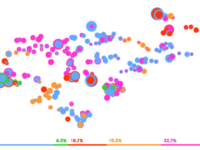With the aim of continuing to promote confidence in legislative work and to open a more direct channel of communication with the new generations, LEGIS65 is born. LEGIS65 is a virtual assistant whose mission is to help society to know and learn more about the legislative work of Guanajuato, as well as the culture and history of the state, through illustrious characters produced by artificial intelligence tools.
Innovation Tag Opengov: communication
The City of Austin launched Data Impact Visuals & Exploration (DIVE) to address low data literacy, limited accessibility, and lack of decision support tools. This project aims to empower diverse users with data skills, tools, and resources to make informed decisions. DIVE benefits community members, City staff, universities and funders. Innovative features include user-centric design, multiple components, a community-based approach and a long-term sustainability plan.
Case Study
Uchi Creativo, revaluing cultural identity in the indigenous and peasant communities of Amazonas –…
The progressive loss of cultural identity in the indigenous and peasant communities of the Amazon region (Urakusa, Shushug, Pakuy and Leymebamba - 6500 inhabitants), led the population to ask the State to support the formulation and implementation of an action plan, including the direct participation of indigenous youths. A total of 123 children participated in the creation of copyright protected literary and artistic works to revitalise cultural heritage, and over 1,115 Awajún indigenous…
Easy Government invites people with disabilities to redesign legal and administrative texts (i.e., laws, subsidy formulares) using an easy-to-read approach based on pictograms, simple words, short paragraphs, and the creation of new products that are simpler and clearer for all audiences (i.e., seniors, immigrants, people with low reading comprehension, children). With the lenses focused on diversity and inclusion we seek to address complex issues faced by these population groups.
Case Study
Monitoring of the Implementation of the Access to Information Act in the Federal Executive Branch
With the maturing of the Transparency Policy in the Brazilian Federal Executive Branch, there was a need to broaden the assessment of the implementation of the Access to Information Act. The innovation here lies in the methodology adopted, which was previously quantitative and is now also qualitative, allowing an improvement in the answers provided to citizens and the extension of the transparency culture, favoring all stakeholders: public bodies under assessment, citizens and the Government.
Citizen-centric Municipal Governance Scorecard is an innovation for improving local good governance. The main objective is furthering local good governance through transforming good governance principles into practical, measurable processes and actions. The model consisted of 227 indicators for the seven principles along decision-making, resource allocation, service delivery and institutional capacity stages. The data collection is geared for citizen use, based on digitally available…
In one sentence, the floating Parliament Accounts Committee between Small Pacific Islands State creates a multi-national team of experts who simplifies budget processes while transparently saving resources. A cost-effective measure to share expertise, boost accountability and communicate openly about Governments’ budget processes while providing MPs with the best guidance possible.
Converlens emerged from the Australian government’s 2017/18 Business Research and Innovation Initiative (BRII) "Digitally enabled community engagement in policy and programme design" challenge. The BRII challenge linked into OGP Australia’s first National Action Plan. Deploying artificial intelligence (AI) to provide a smart layer of qualitative natural-language processing techniques (NLP), Converlens assists people in government to excel at managing the submissions and communications…
As a criminal court judge I felt the need to implement concrete actions to establish a new way of adjudicating in my country (Argentina) by relying on Open Government’s principles. Among some of the implemented policies, we publish all of the court's decisions, the court hearings' agenda, statistics and reports on the administration of the court and the biographical information of the court's employees. We do so by using our Twitter (@jpcyf13) and YouTube accounts.
Case Study
Prioritising indicators from items in big data: An algorithm for an automated, visual approach
Identifying representative indicators requires distinguishing the driving forces and directions of relationships in innovation, economic or health data.
The innovation is an algorithm, a sequence of coded instructions, automated to derive visual tools directly from big data.
The algorithm is adaptable to various fields of study for rapid, data visualisation and enables transparent, evidence-based indicator prioritisation.


